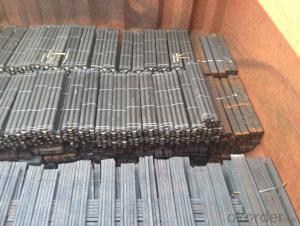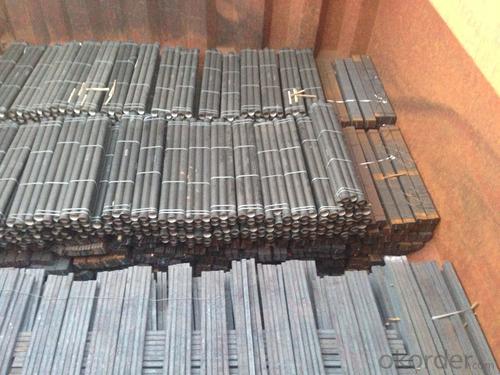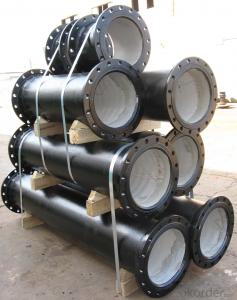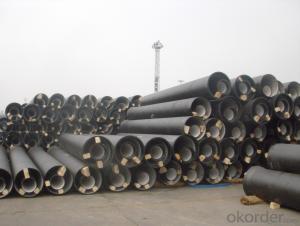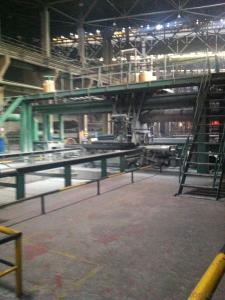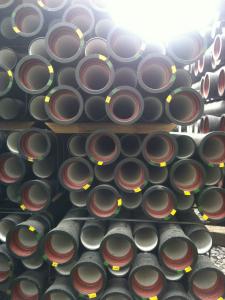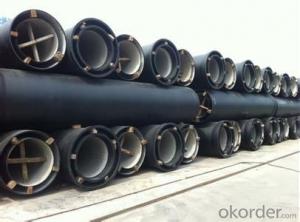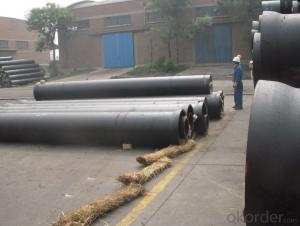DUCTILE IRON PIPES PIPE FITTINGS K8 CLASS DN500
- Loading Port:
- Tianjin
- Payment Terms:
- TT OR LC
- Min Order Qty:
- 25 m.t
- Supply Capability:
- 30000 m.t/month
OKorder Service Pledge
OKorder Financial Service
You Might Also Like
Material : Ductile Cast Iron
Size Range : DN 80mm to DN 2000mm
Unit Effective Length : 6m or 5.7m
Manufacture Standard: ISO 2531:1998/ EN 545:2006/EN 598:2007
Annual capacity : 200,000 tons
Coating Exterior: Zinc 130g/m2 according to ISO 8179-1 and bitumen coating 70 microns.
Cement Interior: Portland Cement/ High Alumina Cement/ Sulphate Resisting Cement Lining according to ISO 4179
Special requirements on external coating and internal lining can be applied
We also provide accessories such as SBR/EPDM rubber gaskets, lubricant paste, pipe caps, PE sleeves, etc.
Additional Parts:
Each pipe is strictly inspected according to related standard to ensure permanently high performance.
Easy Installation at site and service free for life
Long Service Lifespan
Quotation will arrive you within 24hours once we get your inquiry.
We guarantee offering you a competitive price.
A copy of original inspection reports of pipes will be offered after shipment.
Photos of loading process will be sent to the customer after shipment effect.
We will follow-up the delivery progress after shipment effect and update to the customer on weekly basis.
- Q: What are the typical joint restraint requirements for ductile iron pipes?
- Ductile iron pipes typically require joint restraints to prevent separation or pulling apart. Two common types of restraints are mechanical joint restraints and push-on joint restraints. Mechanical joint restraints are used when the pipe faces high internal pressures or external loads. They consist of a gland and a follower gland that are tightened around the joint with bolts or clamps. This secures the joint and prevents movement. On the other hand, push-on joint restraints are used when the pipe doesn't face high pressures or loads. They provide a seal and prevent separation due to ground movement or external forces. Push-on joint restraints are installed by pushing the pipe into the joint and securing it with a ring or collar. In addition to joint restraints, proper bedding and backfill materials are important for ductile iron pipes. These materials help distribute loads and provide stability, further enhancing the pipe's resistance to joint separation. It's important to note that the specific joint restraint requirements may vary depending on project specifications, pipe size, and operating conditions. Therefore, consulting the manufacturer's recommendations and engineering standards is essential for selecting and installing the proper restraints.
- Q: What is the expected buoyancy of ductile iron pipes?
- The expected buoyancy of ductile iron pipes is minimal due to their high density and weight.
- Q: Are ductile iron pipes suitable for installation in areas with high traffic loads?
- Ductile iron pipes are indeed suitable for installation in areas characterized by heavy traffic loads. The reason behind this lies in the remarkable strength and durability of ductile iron, rendering it an optimal selection for situations involving substantial loads and consistent traffic. This material possesses outstanding resistance to impact and can endure heavy loads without succumbing to cracks or fractures. Furthermore, ductile iron pipes boast a notable capacity for bearing heavy loads, enabling them to effectively withstand the weight and pressure imposed by vehicles and other weighty machinery. Consequently, these pipes find widespread utilization in locations such as highways, roads, bridges, and other regions experiencing significant traffic volumes.
- Q: Can ductile iron pipes be used for both water and sewage systems?
- Yes, ductile iron pipes can be used for both water and sewage systems. Ductile iron pipes are known for their high strength and durability, making them suitable for a wide range of applications, including water supply and sewage systems. These pipes have a high resistance to corrosion, making them ideal for carrying both clean water and sewage. Additionally, ductile iron pipes have excellent mechanical properties, allowing them to withstand the high pressure and stress that can be present in water and sewage systems. Therefore, ductile iron pipes are a reliable and versatile choice for both water and sewage systems.
- Q: How to control mortar proportioning in ductile iron pipe cement coating
- The mixing ratio of ductile iron pipe cement coating mortar is indicated on the design drawings, and the amount of raw material can be calculated according to mortar varieties and mixture ratio.
- Q: How do ductile iron pipes handle ground settlement near construction foundations?
- Ductile iron pipes are known for their ability to handle ground settlement near construction foundations effectively. Due to their flexible nature, these pipes can withstand ground movement without experiencing severe damage or failure. When the ground settles near construction foundations, it can cause shifts in soil, which in turn can exert pressure on the surrounding infrastructure. Ductile iron pipes have the advantage of being able to absorb and distribute this pressure, minimizing the risk of pipe breakage or deformation. One key factor that contributes to the resilience of ductile iron pipes is their high tensile strength. This strength allows the pipes to maintain their structural integrity even under significant external forces. As a result, they can withstand ground settlement without experiencing fractures or cracks. Furthermore, ductile iron pipes also have a high degree of flexibility. This flexibility enables them to adapt to minor ground movements and accommodate shifts in soil without compromising their functionality. The pipes can bend slightly without breaking or causing leaks, ensuring continuous flow of fluids and preventing any disruptions to the construction project. In addition, ductile iron pipes are often installed with proper bedding and backfill materials. This ensures that the pipes have a stable and secure foundation, reducing the risk of movement and settlement. The use of these materials also helps distribute the load exerted on the pipes more evenly, further enhancing their ability to handle ground settlement. Overall, ductile iron pipes are an excellent choice for construction projects where ground settlement is a concern. Their strength, flexibility, and proper installation techniques allow them to effectively handle ground movement near construction foundations, providing reliable and long-lasting infrastructure.
- Q: A tube is used only in ductile iron pipes, isn't it?
- Ductile weakness: ductile cast iron pipes connected by human factors such as the operation level of responsibility, influence, construction not convenient. The advantages of PE PE PE pipe has good corrosion resistance and its anti inorganic performance than that of the metal pipe is much stronger in the buried without corrosion, construction convenient. Small diameter PE pipe in the price performance ratio is better than that of steel and ductile iron.PE tube have disadvantages: benzene, gasoline, carbon tetrachloride and other organic solvents have certain effect on pe. If the organic solvent is infiltrated into the polyethylene, the swelling will occur, and its physical properties will be decreased. Its pressure resistance and temperature resistance are poor.
- Q: Can ductile iron pipes be used in areas with high soil acidity and alkalinity?
- Ductile iron pipes can generally be used in areas with high soil acidity and alkalinity. However, it is important to consider the specific conditions and take appropriate measures to mitigate the potential effects of these soil characteristics on the pipes. In areas with high soil acidity, the acidic conditions can promote corrosion of metal pipes, including ductile iron. To prevent this, protective measures such as applying an external coating or using cathodic protection can be implemented. These measures help to create a barrier between the pipe and the corrosive environment, extending the longevity of the pipes. Similarly, in areas with high soil alkalinity, the alkaline conditions can also have an impact on the performance of ductile iron pipes. Alkaline soils can cause the formation of calcium carbonate deposits, commonly known as scale, which can reduce the flow capacity of the pipes over time. Regular maintenance and cleaning of the pipes can help mitigate the effects of scale buildup. It is worth noting that the suitability of ductile iron pipes in areas with high soil acidity and alkalinity may also depend on the specific grade and quality of the pipes. Manufacturers often provide guidelines and recommendations regarding the use of their products in various environmental conditions. It is advisable to consult with pipe manufacturers or industry experts to ensure proper selection and installation of ductile iron pipes in such areas.
- Q: Are ductile iron pipes suitable for potable water applications?
- Ductile iron pipes are indeed suitable for potable water applications. Their reliability and durability have been demonstrated through their longstanding use in water distribution systems. These pipes exhibit a commendable resistance to corrosion, a crucial factor in upholding the quality of drinking water. Moreover, ductile iron pipes possess a high tensile strength, reducing the likelihood of breakage or leakage. Furthermore, their smooth interior surface aids in maintaining optimal water flow and preventing the accumulation of deposits or contaminants. In conclusion, ductile iron pipes are an appropriate selection for potable water applications due to their impressive strength, durability, and corrosion resistance.
- Q: The plug connection DN800 ductile iron pipe has been installed. "Shall I think so?"
- In many areas of our country, ductile iron pipe in the middle and small diameter to tube connected with the tube, the bearing type or flange interface method; ductile iron, angle limit must be allowed better seismic performance and sealing performance.
Send your message to us
DUCTILE IRON PIPES PIPE FITTINGS K8 CLASS DN500
- Loading Port:
- Tianjin
- Payment Terms:
- TT OR LC
- Min Order Qty:
- 25 m.t
- Supply Capability:
- 30000 m.t/month
OKorder Service Pledge
OKorder Financial Service
Similar products
Hot products
Hot Searches
Related keywords
